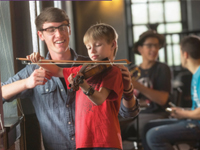 The 2013 Grand Chapter Conclave was a turning point for the future of philanthropy in SigEp. Two years earlier, a new charity partner was proposed, and a task force was charged to review it and assess SigEp’s overall philanthropic efforts. The recommendation? SigEp should select a single philanthropy that allowed undergraduates and alumni to live and practice the values of the Fraternity. In short, philanthropy in SigEp would always be about active involvement and not just words or money. At Conclave, the task force’s recommendations were adopted and Big Brothers Big Sisters of America was selected as SigEp’s single national philanthropic and service learning partner. So begins a new era in SigEp service learning, one that combines national recognition and local support opportunities for every chapter.
The 2013 Grand Chapter Conclave was a turning point for the future of philanthropy in SigEp. Two years earlier, a new charity partner was proposed, and a task force was charged to review it and assess SigEp’s overall philanthropic efforts. The recommendation? SigEp should select a single philanthropy that allowed undergraduates and alumni to live and practice the values of the Fraternity. In short, philanthropy in SigEp would always be about active involvement and not just words or money. At Conclave, the task force’s recommendations were adopted and Big Brothers Big Sisters of America was selected as SigEp’s single national philanthropic and service learning partner. So begins a new era in SigEp service learning, one that combines national recognition and local support opportunities for every chapter.
When Nick Traverso, Baldwin Wallace ’16, returned home for the holidays this year, he noticed a change, not in his parents or in his hometown, but in himself. Over the break, Traverso and his younger brother connected better than they ever had before. In place of silently playing video games, they talked frequently, went places together and truly bonded. When the time came to return to campus, Traverso’s younger brother specifically thanked him for coming home and for spending time together.
Traverso attributes the change in his relationship to his involvement in Big Brothers Big Sisters (BBBS). At the beginning of the school year, he and a fellow SigEp brother, along with other Baldwin Wallace students, volunteered to mentor a group of children who made weekly visits to campus through BBBS. Traverso was paired with a “little brother” name Ethan. The relationship had a profound impact on him.
“It changed the way I look at a lot of things,” Traverso said. “Being a big brother makes you think about every little thing that you do because you want your little brother to see you making the right decisions. It made me want to be a better example.” After mentoring a “little brother” on campus, Traverso felt a need and a desire to better connect with his biological younger sibling. He also felt like he was better able to do so. As a result of being a big brother, he could communicate better and learned that a relationship grows just by doing something together.
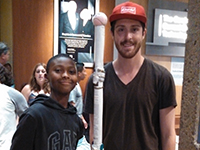 For Josh Olsen, Northeastern ’15, the moment of truth came from his “match advocate” at BBBS who checks in on how the relationships are going. She had just talked to the mother of his little brother, 12-year-old Jawuan Wiggins. “She said that Jawuan was always excited before my visits, that I was easy to talk to and someone who he felt comfortable around. In that moment, I realized that being a positive role model didn’t take grand gestures. It was as simple as being consistent and being myself.”
For Josh Olsen, Northeastern ’15, the moment of truth came from his “match advocate” at BBBS who checks in on how the relationships are going. She had just talked to the mother of his little brother, 12-year-old Jawuan Wiggins. “She said that Jawuan was always excited before my visits, that I was easy to talk to and someone who he felt comfortable around. In that moment, I realized that being a positive role model didn’t take grand gestures. It was as simple as being consistent and being myself.”
These lessons and experiences capture the highest hopes of SigEp’s decision to designate BBBS as its national philanthropic and service learning partner. In the years ahead, this partnership has the potential to fundamentally change how our Fraternity delivers on its commitment to service, nationally and locally.
Connecting volunteer service with SigEp values
Philanthropy is a mission and a mindset to serve others. It is also a central principle of our Fraternity. In the words of former Grand Chapter President Oscar E. Draper, Washington State 1919, “brotherly love must be given in order to be received.” A philanthropic act is, by definition, a token of brotherly love.
Nationally, SigEp has aligned with a host of philanthropic causes, most recently with Youth AIDS, and T.A.K.E. Defense, which promotes female safety and self-defense. A 2011 Task Force charged with evaluating current and future philanthropic partners quickly determined that something more fundamental was at stake.
Task Force Chairman Justin Kingsolver, Indiana ’12, said that “the Task Force agreed that, while SigEp’s current partners are invaluable and important causes, they are not inherently or uniquely SigEp.”
A look at peer organizations showed the benefits of focusing on a single philanthropy. The true challenge was which one. Key criteria emerged: geographic reach that connected every chapter, shared values and mutual benefit for SigEp and the chosen partner. For the task force, Big Brothers Big Sisters stood out among the pack, Kingsolver said.
A century of mentorship
BBBS is one of the oldest and best-known national volunteer organizations of its kind. In 1904 a court clerk in New York noticed that too many troubled boys were passing through his courtroom. He recognized that, through mentoring relationships, caring adults could help many kids stay out of trouble.
Today, one-on-one mentoring remains the cornerstone of BBBS. A big brother or “big” is paired with a “little brother” who has been referred to the program. The big commits to mentoring his “little,” with the support of BBBS staff. From helping with homework to playing sports, shooting pool or simply talking about various life issues, mentoring takes many forms. A big commits to the pairing for at least a year, though many relationships continue well past that time. The impact on big and little alike are profound.
“Big brothers plant seeds of possibility and hope” in their little brothers, said Lowell Perry, senior vice president of BBBS. “But 95 percent of the time, the bigs feel that they get more out of the relationship than the little brother.” To Perry, “being engaged in your community becomes part of your personal legacy.”
According to National Director and Task Force Member Tom Jelke, Florida International ’90, BBBS was selected as SigEp’s philanthropic and service learning partner because its mission fit perfectly with SigEp. “The concept of mentoring, of having a little brother, is familiar to SigEp,” Jelke noted.
BBBS also has the national reach to complement SigEp’s size and resources. A BBBS program is in close proximity to every SigEp chapter. And becoming a mentor adds incalculable value to a student’s college education. “This helps accomplish our goal of Building Balanced Men,” Jelke added. “It allows SigEps to see things differently and helps us become better fathers, brothers and friends. It gives us a different perspective.”
Josh Olsen, coordinator for BBBS efforts at the Northeastern Chapter, sees the mentoring as the bridge between SigEp and BBBS. “Mentoring is a core of the BBBS mission: one-on-one relationships to help change kids lives for the better, to be a positive and stable influence. Mentors in the Fraternity teach us how to best embody our core values and use them to constantly better ourselves.” Now, he can, “be a role model without even thinking about it, a skill that directly translates into mentoring my brothers as they move through the Balanced Man Program.”
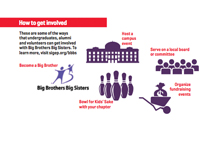 Expanding the mission “beyond ourselves”
Expanding the mission “beyond ourselves”
Perhaps more than anything else, the partnership is designed to incorporate a component of service learning into SigEp life. For many chapters and alumni, “philanthropy” has become synonymous with donations. Typically, chapters invite the campus community to join in an entertaining event where the proceeds are donated to a local or national charity. Once the philanthropy box has been checked for the semester or the year, the chapter moves on. The partnership with BBBS seeks to alter that mentality.
While stressing that chapters should continue existing philanthropy events and relationships with local charities, Task Force Chairman Kingsolver noted that mentoring a little brother provides a learning opportunity that a fundraiser cannot match. “Having 50 SigEps become mentors, and get out into the community, has a different value than 50 individuals donating money to charity,” Kingsolver added.
SigEps are ideal candidates to be big brothers, according to BBBS’s Perry. SigEps can discuss the value of higher education and personal interests in leadership, athletics, music and culture. For a little brother, simply being exposed to a high-achieving and motivated individual like a SigEp opens the doors of opportunity. Perry, a member of Alpha Phi Alpha, explained why fraternity men are so well-suited to become a big brother: “We are achievers, we are competitive, and we are up to the task.”
Without question, mentoring is hard work. It requires a weekly commitment of time and effort. Large check presentations to local charities garner press coverage, while mentoring at-risk youth largely goes unnoticed. Being a big brother also requires the mentor to be selfless and introspective, and it challenges our comfort zones. But that is precisely the point. “It’s a lot easier to put together a fundraiser, write a check and call it a day,” said Traverso, who became a big brother this fall. “But the experience of being a big brother means a heck of a lot more. It teaches a lot you can’t learn in the classroom,” he said.
In this way, BBBS is the perfect complement to SigEp’s mission of Building Balanced Men. We spend much of our lives focused inward on our own personal, academic and professional development. But no matter our stage or station in life, to become balanced men we must look outward and apply our cardinal principles through service to others. This new partnership offers us that.
Getting involved
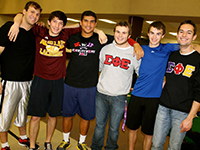 BBBS is relying on SigEp. The demand for big brothers far outstrips the current supply of volunteers. Over 30,000 boys and girls across the country are waiting to be paired with a big. Most are young boys in need of strong male role models. They often come from low-income or single parent families where a parent is incarcerated or is serving in the military.
BBBS is relying on SigEp. The demand for big brothers far outstrips the current supply of volunteers. Over 30,000 boys and girls across the country are waiting to be paired with a big. Most are young boys in need of strong male role models. They often come from low-income or single parent families where a parent is incarcerated or is serving in the military.
Greg Pestinger, Kansas State ’86, a former board member for the Kentucky and Indiana chapters of BBBS helps with long-term planning, branding and strategy for recruiting volunteers and donors. A big brother himself, he knows, “the waiting list is a big deal and has a real effect. Those littles knowing that there is light at the end of the tunnel while they sit on the waiting list is vitally important,” he said. Pestinger got involved with BBBS because “becoming a big brother is one of the best investments you can ever make.” Whether donating your time or your money, “the investment will return 10-fold from a societal standpoint,” Pestinger said.
Becoming a big brother requires no more than a donation of your time, with a typical pairing requiring just four to eight hours per month. But BBBS’s Lowell Perry suggested that time isn’t the reason why many are hesitant to volunteer.
According to Perry, prospective big brothers are conscientious people who “recognize and appreciate the importance of the relationship with the little brother and fear that they won’t make a difference or won’t be successful.” But SigEps needn’t worry, Perry said. “Bigs don’t need to change their life. Just stay involved and be the positive role model that you are. By virtue of your innate ability, you will simply be bringing the little along for the ride.”
Pestinger goes further. “I contribute financially to these two non-profits. Both are also included as beneficiaries in my trust. I volunteer at both when needed. The big reason is that both SigEp and BBBS provide opportunities for young people to build their own lives, to build the skills and confidence they will need to compete in and become productive members of society. BBBS helps boys navigate the path to becoming young men. SigEp helps young men gain life skills to become gentlemen.”
And now the paths of these two great organizations are intertwined.
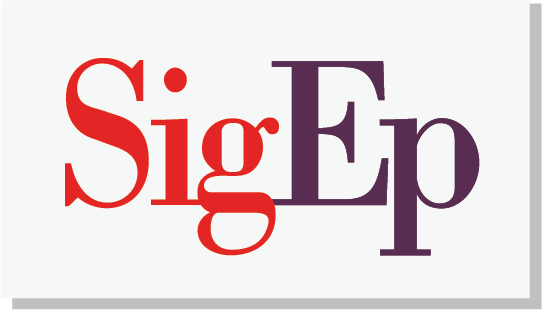








Leave a Reply